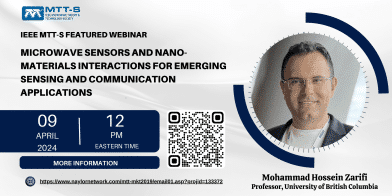
-
Tuesday, April 09, 2024 12:00 pm - 1:00 pm(UTC-05:00) Add to my calendar
Microwave Sensors and Nano-Materials Interactions for Emerging Sensing and Communication Applications
Prof. Mohammad Hossein Zarifi
University of British Columbia
Abstract: The continuous progression of technological innovations, coupled with breakthroughs in material processing methodologies, has propelled the evolution of sophisticated sensor systems, thereby broadening their applicability across an array of diverse sectors. Meanwhile, the emergence of the Internet of Things (IoT) has particularly been a key driver in market growth. Sensors, as fundamental components in IoT devices, are seeing increased demand as the IoT market expands. This is expected to continue, with predictions of billions of connected devices worldwide within the next few years.
RF/Microwave/mmWave sensors, characterized by their non-contact, real-time, label-free, and robust operation, distinguish themselves among a variety of sensor alternatives, presenting significant potential across a wide range of sensing applications. This potential is predominantly attributable to their inherent advantages, which include a relatively uncomplicated fabrication process and seamless compatibility with Complementary Metal-Oxide-Semiconductor (CMOS) technology. Such emerging sensors hold the promise of offering integrated portable sensing platforms with both wired and wireless communication interfaces, catering to real-time monitoring and analysis purposes.
This talk primarily focuses on the integration of cutting-edge nanomaterials and polymers into planar microwave structures, a strategy that promises considerable advancements in sensor technology. These materials, characterized by their unique properties, have the potential to significantly enhance the sensitivity, selectivity, and resolution of microwave sensors. Such enhancements enable these sensors to effectively function within the high-frequency, high-bandwidth landscape of emerging 5G and 6G applications.
Please click here for registration!
Speaker’s Bio: Mohammad Hossein Zarifi (Ph.D. PEng, PRC Tier II, SMIEEE), received the B.Sc., MSc. and Ph.D. degree in electrical and computer engineering from the University of Tabriz, Iran, in 2004, 2006 and 2009 respectively. He is currently an Associate Professor and Tier II Principal’s Research Chair (PRC) in Sensors and Microelectronics with the School of Engineering at the University of British Columbia, and the director of Okanagan MicroElectronics and Gigahertz Applications laboratory (OMEGA Lab), Canada. Prior joining UBC, Dr.Zarifi was a postdoctoral fellow at the University of Alberta from 2013-2017. He has authored or coauthored more than 100 papers in peer-reviewed journals and conference proceedings as well as 5 issued or pending patents. Dr. Zarifi received CMC-NRC first place award, on industrial collaboration, for the innovative microwave sensors, in Canada, at 2015. Dr Zarifi’s research focus on millimetre-wave and tera-hertz (THz) theory and techniques, antenna sensors, microwave and millimeter sensors, and flexible electronics for communication and sensing applications. Dr. Zarifi is a member of IEEE MTT-S TC- 26 “RFID, Wireless Sensor and IoT” and a member of IEEE MTT-S TC- 4 “Microwave Passive Components and Transmission Line Structures”, and a senior member of the IEEE Solid-State Circuits Society, and the IEEE Circuits and Systems Society, and has served as a reviewer for numerous journals and conferences. Dr. Zarifi is also the recipient of the Emerging Researcher Award and the Best teaching award at the School of Engineering, at the University of British Columbia in 2020 and 2021, respectively.